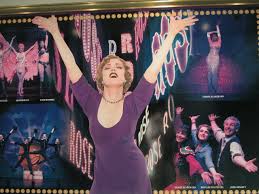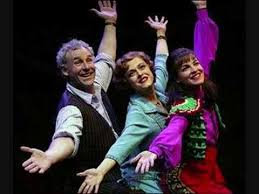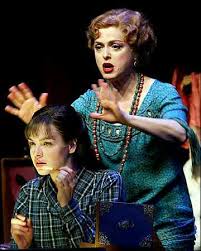Gypsy is a 1959
musical with lyrics by Stephen Sondheim and is loosely based on the 1957
memoirs of Gypsy Rose Lee, the famous striptease artist; it focuses on her
mother, Rose, whose name has become synonymous with "the ultimate show
business mother." It follows the dreams and efforts of Rose to raise two
daughters to perform onstage and casts an affectionate eye on the hardships of
show business life. The character of Louise is based on Lee, and the character
of June is based on Lee's sister, the actress June Havoc.
The musical contains many songs that became popular standards, including
"Everything's Coming up Roses", "Together (Wherever We
Go)", "Small World", "You Gotta Get a Gimmick",
"Let Me Entertain You", "All I Need Is the Girl", and
"Rose's Turn". It is frequently considered one of the crowning
achievements of the mid-20th century's conventional musical theatre art form,
often called the "book musical".
Act I
Rose and her two daughters, Baby June and Louise, play the vaudeville
circuit around the United States in the early 1920s. Rose, the archetype of a
stage mother, is aggressive and domineering, pushing her children to perform.
While June is an extroverted, talented child star, the older girl, Louise, is
shy. The kiddie act has one song, "May We Entertain You", that they
sing over and over again, with June always as the centerpiece and Louise often
as one of the "boys" ("Baby June and Her Newsboys"). Rose
has big dreams for the girls but encounters setbacks, such as attempting to
borrow money from her father ("Some People"). When Rose meets a
former agent, Herbie, she persuades him to become their manager using her
seductive and feminine wiles ("Small World"). The girls grow up, and
June, now billed as Dainty June, and her act have a chance to perform for Mr.
Goldstone of the Orpheum Circuit ("Mr. Goldstone, I Love You").
Meanwhile, Louise celebrates her birthday alone and asks her birthday present,
a lamb, just how old she is this year ("Little Lamb"). After Rose
rejects Herbie's marriage proposal, he considers leaving, but she asserts that
he could never get away from her ("You'll Never Get Away From Me").
Now billed as "Dainty June and Her Farmboys", the act finally
performs on the Orpheum Circuit ("Dainty June and Her Farmboys").
June is soon offered a place at a Performing Arts school after an audition.
However, Rose turns this down, refusing to break up the act. Louise and June
fantasize what life would be like if Rose were married and finished with show
business ("If Momma Was Married"). A few months later, still on the
road from show to show, Tulsa, one of the boys from the act, confides in Louise
that he has been working on his own act ("All I Need Is The Girl"),
and Louise fantasizes that she and he could do the act together. Shortly after,
June is missing, and in a note, she explains that she has grown sick of her
mother and the endless tour and has eloped with Tulsa, and they will do a new
act. Rose is hurt, but then optimistically vows that she will make Louise
a star, proclaiming that "Everything's Coming up Roses".
Act II
Louise is now a young woman, and Rose has built a pale imitation of the
Dainty June act for her. Using all girls, Rose and Herbie try valiantly to sell
"Madame Rose's Toreadorables" to a fading vaudeville industry.
However, they are still together ("Together, Wherever We Go"). With
no vaudeville venues left, Louise and her second-rate act wind up accidentally
booked at a burlesque house in Wichita, Kansas, as a means to deter police
raids. Rose is anguished, as she sees what a booking in burlesque means to her
dreams of success, but Louise persuades her that two weeks' pay for the new act
is better than unemployment. As they are introduced to Louise, three of the
strippers on the bill advise her on what it takes to be a successful stripper,
a "gimmick," something that "makes your strip special"
("You Gotta Get a Gimmick"). Backstage, Rose proposes marriage to
Herbie. He asks her to break up the act and let Louise have a normal life, and
she reluctantly accepts, agreeing to marry the day after their show closes. On
the last day of the booking, the star stripper in the burlesque show is
arrested for solicitation. Desperate, Rose cannot resist the urge to give
Louise another nudge toward stardom, and she volunteers Louise to do the strip
tease as a last-minute replacement. Disgusted at Rose's blind ambition for her
daughter, Herbie walks out on Rose forever ("Small World (Reprise)").
Although reluctant, Louise wants to please her mother and she goes on, assured
by Rose that she need not actually strip, but simply walk elegantly and tease
by dropping a single shoulder strap. Shy and hesitant, she sings a titillating
version of the old kiddie act song, "May We Entertain You?". She removes
only her glove, but she speaks directly to her 'audience', which becomes her
"gimmick" ("Let Me Entertain You (Gypsy Strip Tease)").
In the months that follow Louise becomes secure, always following her
mother's advice to "Make 'em beg for more, and then don't give it to
them!" The song becomes brasher and brassier, and more and more articles
of clothing come off. Ultimately, Louise becomes a major burlesque star and
does not need her mother any longer. After a bitter argument between Rose and Louise,
who has become the sophisticated "Gypsy Rose Lee," Rose realizes
Herbie and June are both gone, and now Louise is lost to her as well. Rose,
feeling sad, useless and bitter, asks "Why did I do it? What did it get
me?" ("Rose's Turn"). All of Rose's unrequited dreams of her own
stardom and her personal demons surface. She fantasizes about her own lit-up
runway and cheering audience, but finally admits "I did it for me."
After her admission to Louise, mother and daughter tentatively step toward reconciliation
in the end.
In the 1974 and 2008 Broadway revivals, although the final dialogue scene
remains, there is not a happy ending, but rather a bleak, sad one as all hopes
of reconciliation for Rose and Louise fall flat when Louise walks away,
laughing sarcastically at Rose's new "dream." The audience is then
left with a Rose whose dream of her own lit up marquee slowly fades away to her
craziness within taking over.
In the 2003 revival starring Bernadette Peters, the final dialogue scene
remains, but leaves the ending open to more interpretation from the audience.
Louise walks through the stage door, with Rose following behind. Rose then
turns to face the audience, a look of sadness and longing on her face as she
takes one last look at the empty stage. She pauses and slowly closes the door.
In the 2015 West End revival starring Imelda Staunton, Louise begins to
walk out, and Rose catches up after waking up to reality. Louise puts her arm
around Rose as they exit together, giving off the appearance that Louise is taking
care of Rose instead.







